Middle East
Iran’s FM visits Saudi Arabia, Qatar before nuclear talks with US in Oman | Politics News

The Iranian Ministry of Foreign Affairs has confirmed there will be a technical delegation at the Iran-US talks in Oman on Sunday.
Iran’s Foreign Minister Abbas Araghchi has visited Saudi Arabia and is due to visit Qatar for consultations in the run-up to the fourth round of indirect nuclear talks with the United States, which will take place in Oman on Sunday.
The future direction of Iran’s nuclear programme, its enrichment of uranium, and sanctions relief remain the key issues.
Araqhchi’s Gulf tour on Saturday comes after Tehran confirmed the latest round Friday: “The negotiations are moving forward, and naturally, the further we go, the more consultations and reviews are needed,” Araghchi said in remarks carried by Iranian state media.
Omani Foreign Minister Sayyid Badr Albusaidi said on Friday that, after “coordination with both Iran and the US”, the delayed talks would go ahead in Muscat. The fourth round, initially scheduled for May 3 in Rome, was postponed for what Oman described as “logistical reasons.”
A source familiar with the matter said on Friday that US President Donald Trump’s special envoy, Steve Witkoff, plans to attend the meeting in Oman.
Ongoing dispute over nuclear programme
The talks come against the backdrop of a long-running dispute over Iran’s nuclear ambitions. The meeting is the latest effort to revive diplomacy after years of rising tensions.
Successive US administrations have sought to prevent Iran from acquiring a nuclear weapon. A sustained effort by world powers during the Barack Obama administration culminated with a 2015 agreement called the Joint Comprehensive Plan of Action (JCPOA).
The multilateral agreement created a framework for Iran to receive much-needed relief from international sanctions, in exchange for reducing its uranium enrichment and submitting to inspections of its nuclear facilities.
But when Trump succeeded Obama as US president, he unilaterally withdrew the US from the nuclear agreement in 2018, causing the deal to crumble.
Some Western countries argue that Iran’s programme, accelerated after the US walkout from the 2015 accord, is aimed at developing weapons. Tehran maintains that its nuclear activity is entirely civilian.
Trump himself has acknowledged tensions in his policy on Iran, saying at the start of his second term that hawkish advisors were pushing him to step up pressure reluctantly.
In an interview on Thursday, Trump said he wanted “total verification” that Iran’s contested nuclear work is shut down, but through diplomacy.
“I’d much rather make a deal” than see military action, Trump told the conservative radio talk show host Hugh Hewitt.
“There are only two alternatives – blow ’em up nicely or blow ’em up viciously,” Trump said.
In an interview with Breitbart News on Friday, Witkoff said the US would “take [Iran] at their word” that they do not want nuclear weapons, but set out specific conditions for verifying such a position.
“If that’s how they feel, then their enrichment facilities have to be dismantled. They cannot have centrifuges. They have to downblend all of their fuel that they have there and send it to a faraway place — and they have to convert to a civil programme if they want to run a civil programme,” he said.
US Secretary of State Marco Rubio earlier raised the possibility of Iran importing enriched uranium for any civilian energy.
Iran’s Gulf outreach
Araqchi’s trips to Saudi Arabia and Qatar on Saturday are part of what he describes as “continuous consultations” with neighbouring states.
He said the visits aimed to address “concerns and mutual interests” regarding the nuclear issue.
Iranian Foreign Ministry spokesperson Esmail Baghaei confirmed the presence of a technical delegation in the talks in Oman on Saturday.
In an interview with Mehr News, Baghaei stated that the Iranian delegation is comprised of experts and specialists relevant to the current phase of the negotiations. He did not comment on the US team.
Middle East
Israel capitalises as Gaza fatigue sets in | TV Shows
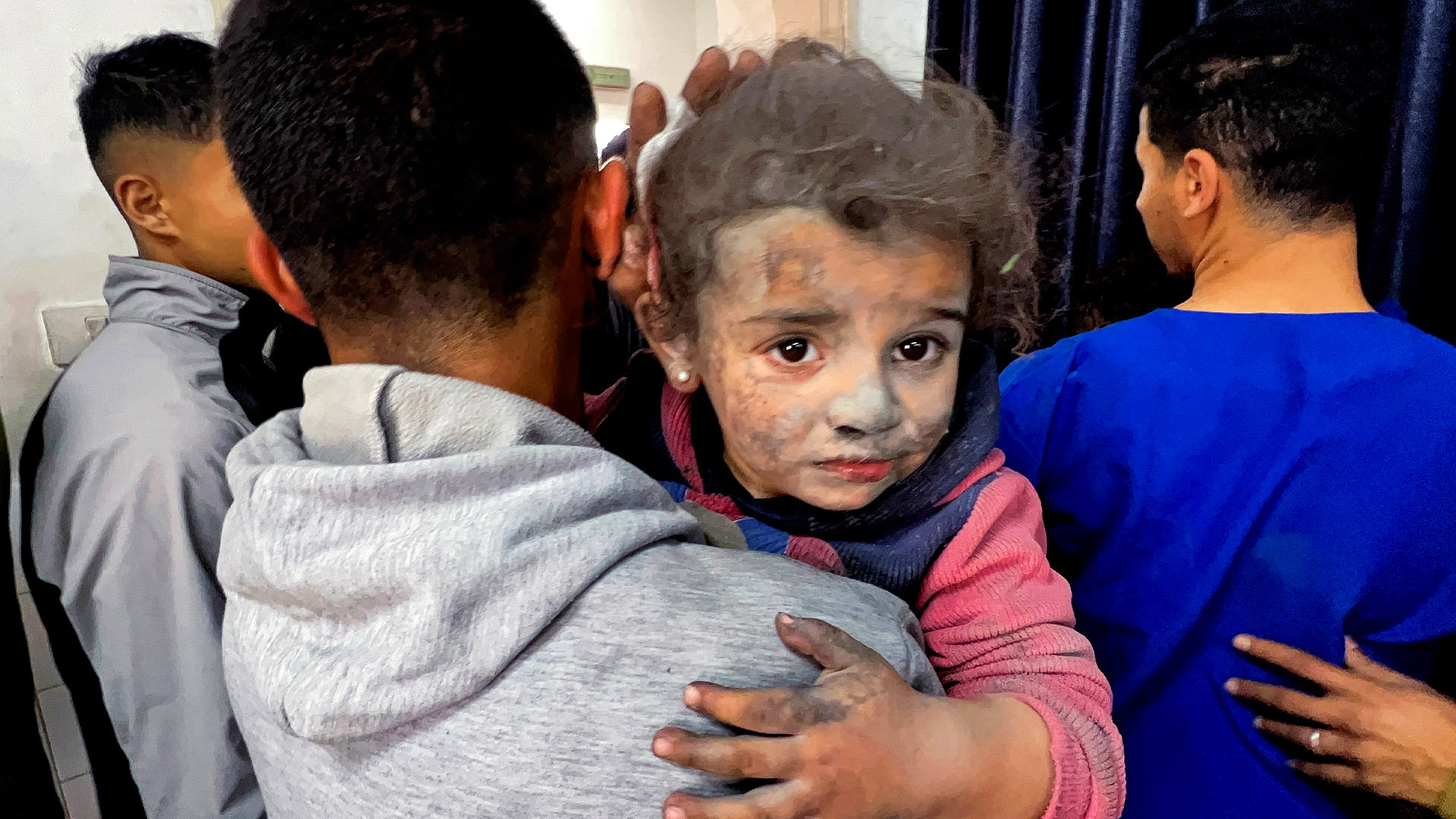
One might think that images of starving children, as political leaders withhold aid and openly call for ethnic cleansing, would be topping news agendas everywhere. In the case of Gaza, the failure of many in the international media to meet the moment has made them part of the story.
Lead contributors:
Chris Doyle – Director, Council for Arab-British Understanding
Daniel Levy – President, US/Middle East Project
Muhammad Shehada – Visiting fellow, ECFR
Sarah Leah Whitson – Director, DAWN
On our radar:
As India and Pakistan go toe-to-toe in their most intense fighting for decades, a flood of disinformation is fuelling the sense of panic on both sides. Meenakshi Ravi reports.
Seeking justice on Ghana’s courtroom shows
If you are dealing with something personal and painful – a broken marriage or a family dispute – you might turn to a friend. For something as serious as sexual assault, it might go to trial. But in Ghana, more and more people are turning somewhere else: live radio. The so-called “justice-style” shows promise swift, public resolutions. But they are also controversial, with critics accusing them of turning private pain into primetime theatre.
Featuring:
George Sarpong – Executive secretary, National Media Commission
Menenaba – Ghanaian writer
Oheneni Adazoa – Host, Sompa Nkomo Show
Zakaria Tanko Musah – Lecturer in media law and ethics, Journalism Institute
Middle East
Israeli protesters in Tel Aviv demand an end to war on Gaza | Israel-Palestine conflict News
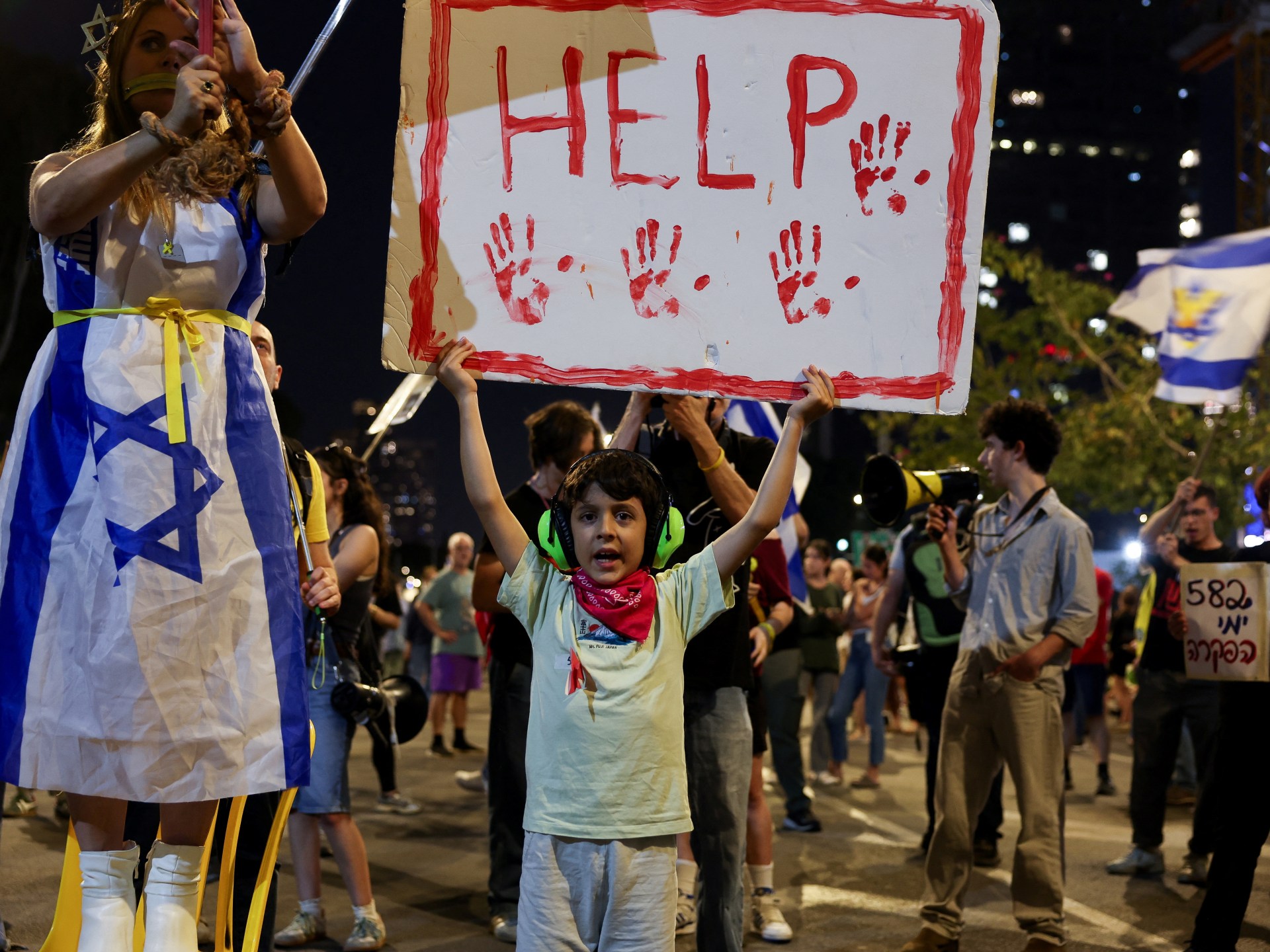
Thousands gather demanding an end to the war and the release of Israeli captives in Gaza.
Thousands of Israelis rallied in central Tel Aviv, calling on the government to end the war on Gaza and secure the immediate release of Israeli captives held in the besieged Palestinian enclave.
The Israeli newspaper Haaretz reported that in Tel Aviv, the Hostages and Missing Families Forum, an Israeli campaign group, held its weekly rally Saturday in “Hostages Square”, while another demonstration by families of captives is taking place outside the Israeli military headquarters.
A separate antigovernment protest is also occurring at Habima Square in Tel Aviv.
The Times of Israel reported that Shai Mozes, whose parents were held captive and released in separate exchange deals, told the crowd at the protest in Habima Square that Israel’s “real enemy is not Hamas, but Prime Minister Benjamin Netanyahu, who is destroying Israel as a Jewish and democratic state”.
Netanyahu’s critics in Israel have accused the prime minister of extending the war for his own personal and political survival.
Haaretz also reported that protests are expected in other cities, including Jerusalem, Haifa, and Beersheba, as well as at dozens of other sites and intersections across Israel.
After Netanyahu announced an expanded offensive in the Gaza Strip on Monday, the Hostages and Missing Families Forum criticised the move in a statement, saying the plan is “sacrificing” those still held in the Palestinian territory.

Hamas releases video of two Israeli captives alive in Gaza
Hamas’s armed wing released a video on Saturday showing two Israeli captives alive in the Gaza Strip, with one of the two men calling to end the 19-month-long war.
Israeli media identified the pair in the undated video as Elkana Bohbot and Yosef Haim Ohana.
The three-minute video released by Hamas’s Qassam Brigades shows one of the captives, identified by media as 36-year-old Bohbot, visibly weak and lying on the floor wrapped in a blanket.
Ohana, 24, speaks in Hebrew in the video, urging the Israeli government to end the war in Gaza and secure the release of all remaining captives.
Bohbot and Ohana were both abducted by Palestinian fighters from the site of a music festival during Hamas’s attack on southern Israel on October 7 2023.
Middle East
At least 33 people killed in suspected RSF attacks in Sudan | Sudan war News
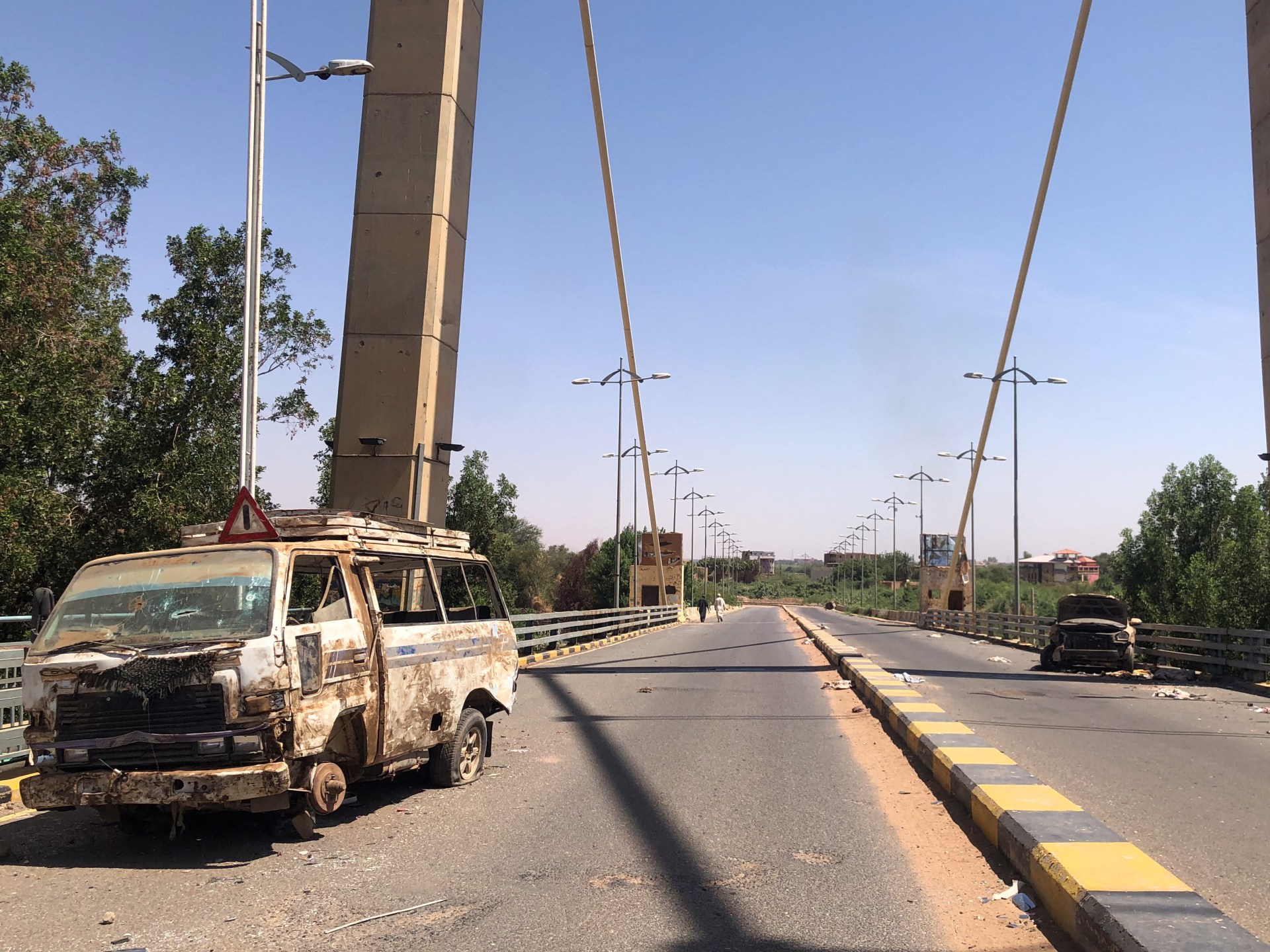
The paramilitary force has been blamed for attacks on a prison in el-Obeid and a displacement camp in Darfur.
At least 33 people have been killed in Sudan in attacks suspected to have been carried out by the paramilitary Rapid Support Forces (RSF) as the brutal two-year war claims its latest victims.
An RSF strike on a prison on Saturday in el-Obeid killed at least 19 people, while on Friday evening, at least 14 members of the same family were killed in an air attack in Darfur, local sources said.
The attacks – part of the RSF’s ongoing war with the military-led government’s Sudanese Armed Forces (SAF) since 2023 – came after six straight days of the paramilitary group’s drone attacks on the army-led government’s wartime capital of Port Sudan.
These attacks damaged key infrastructure, including a power grid and the country’s last operational civilian airport, which was a key gateway for aid into the war-ravaged nation.
The war has left tens of thousands dead, displaced 13 million people and triggered what the United Nations calls the world’s worst humanitarian crisis.
The attack on the prison on Saturday also wounded 45 people, a medical source told the AFP news agency. The source said the jail in the army-controlled city in the North Kordofan state capital was hit by an RSF drone.
The night before, 14 people were killed at the Abu Shouk displacement camp near el-Fasher in Darfur, a rescue group said, blaming the paramilitary.
The camp “was the target of intense bombardment by the Rapid Support Forces on Friday evening”, said the group of volunteer aid workers.
The camp near el-Fasher, the last state capital in Darfur still out of the RSF’s control, is plagued by famine, according to the UN.
It is home to tens of thousands of people who fled the violence of successive conflicts in Darfur and the conflict that has been ripping Africa’s third-largest country asunder since 2023.
The RSF has shelled the camp several times in recent weeks.
Abu Shouk is located near the Zamzam camp, which the RSF seized in April after a devastating offensive that virtually emptied it.
RSF escalation
Elsewhere on Saturday, SAF warplanes struck RSF positions in the Darfur cities of Nyala and el-Geneina, destroying arms depots and military equipment, a military source told AFP.
The RSF has recently said it had taken the strategic town of al-Nahud in West Kordofan, a key army supply line to Darfur.
The RSF’s escalation in Port Sudan earlier this month came after the military struck the Nyala airport in South Darfur, where the RSF receives foreign military assistance, including drones. Local media stated that dozens of RSF officers were killed in the attack.
Sudan’s army-aligned authorities accuse the United Arab Emirates of supplying those drones to the RSF, which has no air force of its own.
The war began as a power struggle between SAF chief Abdel Fattah al-Burhan and his former deputy, RSF commander Mohamed Hamdan Dagalo. It has effectively divided the country into two, with the army controlling the north, east and centre, while the RSF and its allies dominate nearly all of Darfur in the west and parts of the south.
Both sides have been accused of committing war crimes.
-
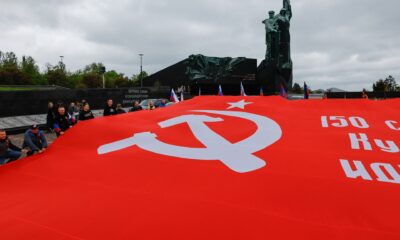
 Conflict Zones2 days ago
Conflict Zones2 days agoRussia-Ukraine war: List of key events, day 1,170 | Russia-Ukraine war News
-
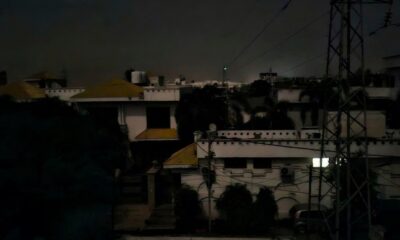
 Conflict Zones2 days ago
Conflict Zones2 days ago‘Missiles in skies’: Panic in Indian frontier cities as war clouds gather | India-Pakistan Tensions News
-
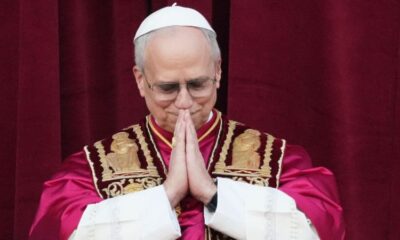
 Europe2 days ago
Europe2 days agoPope Leo XIV urges cardinals to make themselves ‘small’ in first mass as pontiff
-

 Middle East1 day ago
Middle East1 day agoSyria’s Druze divided as sectarian tensions linger after violence | Syria’s War News
-
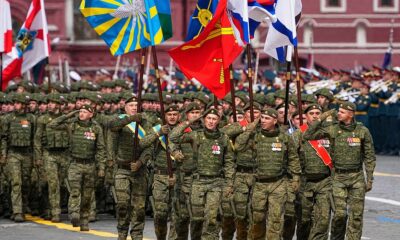
 Africa1 day ago
Africa1 day agoRussia stages massive victory day parade, Putin hails troops in Ukraine as foreign leaders attend
-
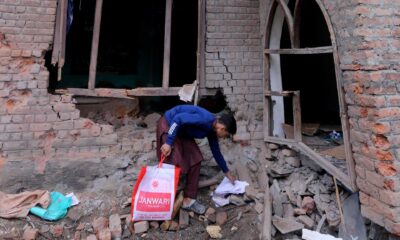
 Conflict Zones1 day ago
Conflict Zones1 day ago‘Slippery slope’: How will Pakistan strike India as tensions soar? | India-Pakistan Tensions News
-

 Europe1 day ago
Europe1 day agoUkraine’s Western allies pile pressure on Putin, threatening sanctions if he refuses 30-day truce
-

 Lifestyle1 day ago
Lifestyle1 day agoTwo dolls instead of 30? Toys become the latest symbol of Trump’s trade war




